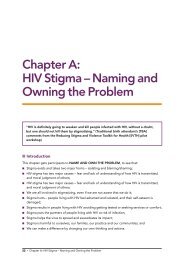Implementing Multiple Gender Strategies to Improve HIV and ... - ICRW
Implementing Multiple Gender Strategies to Improve HIV and ... - ICRW
Implementing Multiple Gender Strategies to Improve HIV and ... - ICRW
You also want an ePaper? Increase the reach of your titles
YUMPU automatically turns print PDFs into web optimized ePapers that Google loves.
quantitative data, which are then periodically analyzed as part of the<br />
TASO Management Information System. Qualitative data periodically<br />
are analyzed by staff <strong>to</strong> inform decision-making.<br />
• Service access: There are plans <strong>to</strong> evaluate services with the goal of<br />
increasing access <strong>and</strong> utilization, particularly regarding services<br />
addressing gender-based violence.<br />
Evaluation Results • Program reach:<br />
- TASO centers provided services <strong>to</strong> 90,000 people in 2007.<br />
- TASO centers provided counseling <strong>to</strong> 59,949 people (41,962<br />
female <strong>and</strong> 17,987 male) in 2007.<br />
- TASO center drama groups conducted 928 performances reaching<br />
239,884 people (101,444 female <strong>and</strong> 138,440 male) in center<br />
communities.<br />
- Mini-TASOs provided counseling <strong>to</strong> 115,142 people (79,983 female<br />
<strong>and</strong> 35,159 male).<br />
- From the 88 TASO supported-communities, community volunteers<br />
educated 370,458 people on <strong>HIV</strong> <strong>and</strong> AIDS (208,397 female <strong>and</strong><br />
162,061 male) <strong>and</strong> counseled 53,135 clients (20,748 female <strong>and</strong><br />
24,387 male).<br />
Data collected indicate the following:<br />
- Increasing numbers of new people are seeking services.<br />
- More women than men are seeking services (65 percent female<br />
<strong>and</strong> 35 percent male).<br />
- More than 60 percent of TASO clients are in discordant.<br />
partnerships, suggesting a need for greater emphasis on protecting<br />
<strong>HIV</strong>-negative partners.<br />
• Service access: This evaluation has not yet taken place.<br />
Replication <strong>and</strong><br />
Scale-up Activities<br />
• TASO is subgranting <strong>to</strong> mini-TASOs <strong>to</strong> provide TASO-like services in<br />
different districts where TASO service centers are not available.<br />
• By building the capacity of communities <strong>to</strong> h<strong>and</strong>le <strong>HIV</strong> <strong>and</strong> AIDS<br />
challenges through AIDS education <strong>and</strong> sensitization <strong>and</strong> training in<br />
basic <strong>HIV</strong> <strong>and</strong> AIDS counseling skills, TASO broadens its impact<br />
beyond services it can provide directly.<br />
LESSONS LEARNED AND CHALLENGES<br />
Key Findings <strong>and</strong><br />
Lessons<br />
• Involving men has improved progress in some activities, including<br />
condom use, family planning, <strong>and</strong> PPTCT. Activities that have brought<br />
the most benefits include couples counseling, PPTCT, work with<br />
discordant couples <strong>and</strong> peer-<strong>to</strong>-peer education.<br />
• Couples counseling is more effective than individual counseling for<br />
addressing conflicts within a marriage.<br />
• Sensitizing cultural leaders, religious leaders <strong>and</strong> communities <strong>to</strong><br />
address gender issues affecting the transmission of <strong>HIV</strong> creates more<br />
impact than working with individuals.<br />
• Addressing gender-based violence issues effectively requires a<br />
173
















